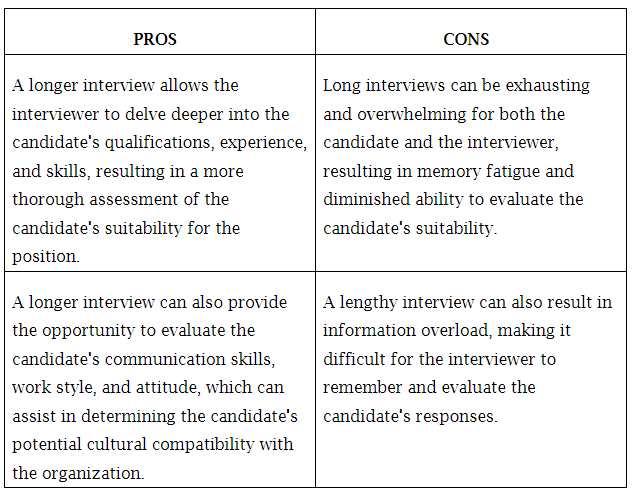
Tips For Interviewers: How Long Should a Job Interview Last?
Interviews are an integral component of the hiring process. One of the most frequently asked questions concerning this crucial part is: how long do interviews last? The duration can vary based on numerous factors, including the job position, the number of interviewers, the interview format, and the complexity of the business’s operations. Both employers and candidates need to understand the factors that affect the interview duration and how to keep it concise and effective.
Today’s post will discuss the factors determining the length of a job interview, the pros and cons of a lengthy interview, and tips for keeping the interview concise. Furthermore, it will also discuss the optimal interview duration from an HR standpoint and how the interview length impacts the hiring process.
Let’s delve into the comprehensive guide on: how long do job interviews last.
How Long Do Interviews Last: Determining Factors
How long do interviews last depend on various factors, including the following:
– Job Position & Requirement: The interview duration can vary based on the complexity of the position and the required level of experience. For instance, an interview for an entry-level position may be shorter than one for a managerial position.
– The number of Interviewers & Interviewees: The interview will likely last longer when there are more interviewers and interviewees. For instance, when multiple candidates are being interviewed for the same position, the interviews may last longer than when only one candidate is being interviewed.
– Interview Structure: The interview format can also affect the interview duration. In-person interviews may last longer than virtual or telephone interviews.
– Company’s Complexity: The interview duration may also be influenced by the complexity of the company’s operations. For example, if the company operates in a highly regulated industry, the interview may be longer due to the need for additional qualification screening and verification.
– Interview Questions: The type of interview questions can also influence the interview length. Open-ended questions requiring detailed responses may lead to longer interviews, whereas closed-ended questions may lead to shorter ones.
Understanding these factors helps determine how long interviews last and can assist the employer and the candidate plan the interview. It is essential to remember that the duration of an interview can vary significantly based on these factors. However, keeping the interview concise and efficient can help ensure the necessary information is covered within the allotted time. The following section will discuss the benefits and drawbacks of a lengthy interview.
Long Interview: Pros & Cons
The duration of a job interview can affect its efficiency in assessing a candidate’s qualifications for the position. While longer interviews may appear more comprehensive, they can also have disadvantages. Here are some advantages and disadvantages of a lengthy interview:

How to Keep the Interview Precise and Efficient: Effective Tips
The tips below keep the interview precise, productive and centered on assessing the candidate’s suitability for the job.
Structured Plan
Prepare a structured interview plan that includes a list of questions and topics to be covered. This can help maintain the interview’s focus and ensure all pertinent topics are covered within the time limit.
Behavioral Questions
Behavioral interview questions can help evaluate a candidate’s past behavior and forecast their future performance. These questions aid in maintaining the interview’s focus on the job requirements and preventing time-wasting digressions.
Section’s Time Limit
Establish a time limit for each section, including the introductions, questions, and conclusion. This can help maintain the interview’s momentum and ensure all the information is covered within the allotted time.
Irrelevant Questions
Avoid asking questions that are irrelevant to the job position. This can help save time and prevent the candidate from being bombarded with unnecessary questions.
Technology
Technology such as video conferencing software can make the interview process more efficient. It can also eliminate the need for transportation and scheduling conflicts.
Panel Interview
Consider conducting a panel interview where multiple interviewers are present. It can help share the responsibility of evaluating the candidate and shorten the interview duration.
How Long Do Job Interviews Last: The Ideal Interview Duration
It is crucial to balance the interview’s length and effectiveness in assessing the candidate’s suitability for the job.
Typically, a job interview lasts 45 to 60 minutes. This period is typically sufficient to evaluate the candidate’s qualifications, experience, skills, and cultural compatibility with the organization. However, the interview duration may be extended if the position is more complex or requires a more in-depth screening.
Interview length can influence the hiring process. If the interview is too brief, the company may not obtain sufficient information to decide the candidate’s suitability for the job. Conversely, if the interview duration is too long, the hiring process may be delayed, resulting in frustration for both the company and the candidate.
Moreover, lengthy interviews can cause candidate fatigue, resulting in a loss of enthusiasm and interest in the position. This can also harm the company’s reputation if the candidate tells others about their experience. Conversely, short interview durations can result in hiring unqualified candidates, resulting in additional training and replacement costs for the company.
Remembering that the interview length should not be the sole factor in assessing a candidate’s suitability for a job is essential. The interview should be organized, focused, and efficient.
Conclusion
There is an interplay of many factors in answering the question: how long do interviews last? However, the ideal interview time is usually 45-60 minutes. It can change depending on the position and the number of applicants being considered.
Preparing a structured interview plan, concentrating on the most pertinent questions, and being aware of time restrictions are important for making the interview precise and effective.
While there is no fixed rule for how long interviews last, it is crucial to establish a balance between the length of the interview and how well it assesses the candidate’s suitability for the job. Interviews are useful in hiring if they are planned and conducted carefully.
Read Also: Red Flags You Can’t Ignore When Interviewing and Hiring